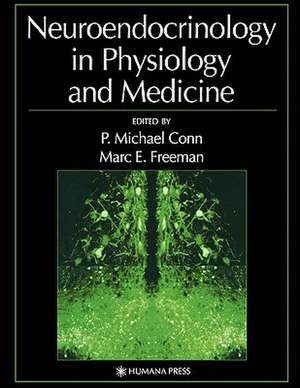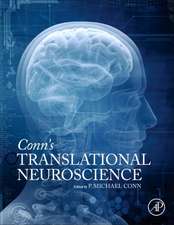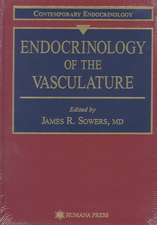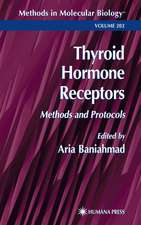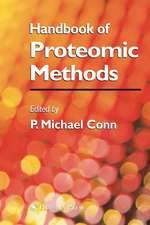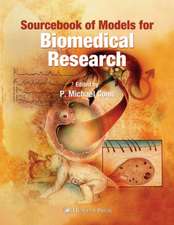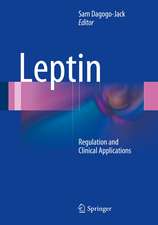Neuroendocrinology in Physiology and Medicine
Editat de P. Michael Conn, Marc E. Freemanen Limba Engleză Paperback – 5 noi 2010
| Toate formatele și edițiile | Preț | Express |
|---|---|---|
| Paperback (1) | 1447.01 lei 6-8 săpt. | |
| Humana Press Inc. – 5 noi 2010 | 1447.01 lei 6-8 săpt. | |
| Hardback (1) | 1458.69 lei 6-8 săpt. | |
| Humana Press Inc. – 6 oct 1999 | 1458.69 lei 6-8 săpt. |
Preț: 1447.01 lei
Preț vechi: 1523.16 lei
-5% Nou
Puncte Express: 2171
Preț estimativ în valută:
276.89€ • 290.42$ • 230.50£
276.89€ • 290.42$ • 230.50£
Carte tipărită la comandă
Livrare economică 01-15 aprilie
Preluare comenzi: 021 569.72.76
Specificații
ISBN-13: 9781617371530
ISBN-10: 161737153X
Pagini: 588
Ilustrații: XII, 574 p.
Dimensiuni: 210 x 279 x 31 mm
Greutate: 1.34 kg
Ediția:Softcover reprint of the original 1st ed. 2000
Editura: Humana Press Inc.
Colecția Humana
Locul publicării:Totowa, NJ, United States
ISBN-10: 161737153X
Pagini: 588
Ilustrații: XII, 574 p.
Dimensiuni: 210 x 279 x 31 mm
Greutate: 1.34 kg
Ediția:Softcover reprint of the original 1st ed. 2000
Editura: Humana Press Inc.
Colecția Humana
Locul publicării:Totowa, NJ, United States
Public țintă
Professional/practitionerCuprins
I. The Interactions Between the Nervous and Endocrine Systems.- 1 The Hypothalamus as an Endocrine Organ: The Science of Neuroendocrinology.- 2 Micro- and Macroscopic Structure, Innervation, and Vasculature of the Hypothalamus.- 3 Hypothalamic Hormones.- 4 Neurotransmitters as Regulators of Hypothalamic Function.- 5 The Hypothalamus as a Major Integrative Center.- 6 Endocrine Targets in the Brain.- II. Neuroendocrine Regulation of Reproduction, Parturition, Lactation, Growth, Development, Metabolism, and Fluid Balance.- 7 Neuroendocrine Regulation of Pituitary Function: General Principles.- 8 Neuroendocrine Regulation of Reproductive Cyclicity.- 9 Neuroendocrine Regulation of Pregnancy and Parturition.- 10 Neuroendocrine Regulation of Lactation and Milk Ejection.- 11 Neuroendocrine Regulation of Growth Hormone Secretion.- 12 Neuroendocrine Regulation of Puberty.- 13 Neuroendocrine Regulation of Thyroid Function.- 14 Neuroendocrine Regulation of Water Balance: The Kidney.- III. Neuroendocrine Correlates of Stress, Behavior, and Biological Processes.- 15 Regulation of the Stress Response by Corticotropin-Releasing Factor Receptors.- 16 Neuroendocrine Regulation of Sexual Behavior.- 17 Neuroendocrine Regulation of Maternal Behavior.- 18 Neuroendocrine Regulation of Fluid Intake and Homeostasis.- 19 Control of Food Intake.- 20 Neuroendocrine Regulation of Learning and Memory.- 21 Neuroendocrine Correlates of Aging.- IV. Neuroendocrine Regulation of Biological Rhythms.- 22 Chronobiology.- 23 Influence of Light and the Pineal Gland on Biological Rhythms.- 24 Neuroendocrine Regulation of Biological Rhythms.- 25 The Neuroendocrine Control of Circadian Rhythms.- 26 The Neuroendocrine Control of Ultradian Rhythms.- V. Neuroendocrine Pathology and Disease.- 27 Diagnosis and Treatment of Hypothalamic Disease.- 28 Hypothalamic Involvement in Disorders of Pituitary Hormone Secretion.- VI. Emerging Areas of Neuroendocrinology.- 29 Neuroendocrine Immunology.- 30 Electrophysiology of Hypothalamic Neurons.- 31 Anatomical Markers of Activity in Hypothalamic Systems.
Recenzii
"This is probably the most comprehensive review of neuroendocrinology available, constituting a complete overview of the subject in basic science and clinical medicine. To achieve complete coverage of the discipline, the book must be large. This one is no exception at over 500 pages, but I can say that most of them are worth reading, because I read them all! This is a very good book. I believe this book will become essential reading, and I strongly recommend it." --- The Endocrinologist
"...the present text is certainly of interest to those biology and medical students who are taught basic courses in neuroendocrinoogy and need a reference book to help them organising their newly acquired knowledge." - Psychoneuroendocrinology
"This book is a pleasure to read. It would be an excellent text for professors, medical students and new graduate students. The authors do a good job of integrating classical endocrinology with the more current molecular approaches...it does an excellent job of conveying and integrating current concepts, all of which are presented clearly and concisely. The presentation of information is pleasing...this will be a text that is much appreciated by students and their professors alike."---- Trends in Endocrinology and Metabolism
" An important text, designed for research fellows, resident pediatricians and endocrinologists. Clearly written and well illustrated."-----Journal of Pediatric Endocrinology & Metabolism
"The editors invited a highly talented and experienced group of authors to prepare the 31 chapters. On the whole, they are well written and supported by meaningful figures. The book does, indeed, nicely bridge the gap between classical endocrine physiology and neuroscience, and comprehensively summarizes these subdisciplines which should not be exclusively relegated to either realm. For example, although standard endocrine volumes typically cover the neural regulation of pituitary function and associated disease states, this book includes thorough chapters on biological rhythm regulation, the influence of hormones on behavior, learning and memory, and neuroendocrine immunology. These are subjects usually found in neuroscience textbooks only. ...this book is a valuable contribution that will be useful to a broad range of individuals, particularly those with some previous exposure to the subject."-Quarterly Review of Biology
"...timely and fills a major void in the discipline, in which there was no recent comprehensive texts covering the topic. This textbook has been designed to provide systematic coverage of analytical, anatomical, functional, clinical and pathologic topics in neuroendocrinology by approximately 50 experts in the field, who are also recognized as skilled teachers....Part V should be interesting for every clinicians, as it deals with neuroendocrine pathology and diseases....The text is intended for fellows, residents, clinicians and basic scientists in the fields of endocrinology, neurology and physiology. Each chapter is very well-written and textual coverage is supported by clear, comprehensive black and white tables and figures. Taken together, Neuroendocrinology in Physiology and Medicine is an outstanding textbook that should serve as a reference support for every interested reader." -Acta Neurologica Belgica
"An important text, designed for research fellows, resident pediatricians and endocrinologists. Clearly written and well illustrated." - Journal of Endocrine Genetics
"...the present text is certainly of interest to those biology and medical students who are taught basic courses in neuroendocrinoogy and need a reference book to help them organising their newly acquired knowledge." - Psychoneuroendocrinology
"This book is a pleasure to read. It would be an excellent text for professors, medical students and new graduate students. The authors do a good job of integrating classical endocrinology with the more current molecular approaches...it does an excellent job of conveying and integrating current concepts, all of which are presented clearly and concisely. The presentation of information is pleasing...this will be a text that is much appreciated by students and their professors alike."---- Trends in Endocrinology and Metabolism
" An important text, designed for research fellows, resident pediatricians and endocrinologists. Clearly written and well illustrated."-----Journal of Pediatric Endocrinology & Metabolism
"The editors invited a highly talented and experienced group of authors to prepare the 31 chapters. On the whole, they are well written and supported by meaningful figures. The book does, indeed, nicely bridge the gap between classical endocrine physiology and neuroscience, and comprehensively summarizes these subdisciplines which should not be exclusively relegated to either realm. For example, although standard endocrine volumes typically cover the neural regulation of pituitary function and associated disease states, this book includes thorough chapters on biological rhythm regulation, the influence of hormones on behavior, learning and memory, and neuroendocrine immunology. These are subjects usually found in neuroscience textbooks only. ...this book is a valuable contribution that will be useful to a broad range of individuals, particularly those with some previous exposure to the subject."-Quarterly Review of Biology
"...timely and fills a major void in the discipline, in which there was no recent comprehensive texts covering the topic. This textbook has been designed to provide systematic coverage of analytical, anatomical, functional, clinical and pathologic topics in neuroendocrinology by approximately 50 experts in the field, who are also recognized as skilled teachers....Part V should be interesting for every clinicians, as it deals with neuroendocrine pathology and diseases....The text is intended for fellows, residents, clinicians and basic scientists in the fields of endocrinology, neurology and physiology. Each chapter is very well-written and textual coverage is supported by clear, comprehensive black and white tables and figures. Taken together, Neuroendocrinology in Physiology and Medicine is an outstanding textbook that should serve as a reference support for every interested reader." -Acta Neurologica Belgica
"An important text, designed for research fellows, resident pediatricians and endocrinologists. Clearly written and well illustrated." - Journal of Endocrine Genetics
Textul de pe ultima copertă
In Neuroendocrinology in Physiology and Medicine, Michael Conn and Marc Freeman have brought together a panel of leading experts to create a comprehensive, integrated treatment of the processes by which the brain acts as an endocrine organ not only to control hormonal functions, but also to maintain homeostasis and regulate behavior. The authors-recognized both as leaders in their fields and as skilled teachers-present the latest findings from basic and clinical science, and provide systematic coverage of the analytical, anatomical, functional, clinical, and pathological aspects of neuroendocrinology. Topics range from the interactions between the nervous and endocrine systems to the regulation of reproduction, development, metabolism, fluid balance, and biological rhythms. Also covered are the role of neuroendocrine pathology in disease, and the neuroendocrine correlates of stress, behavior, and biological processes.
Neuroendocrinology in Physiology and Medicine offers an unprecedented marriage of clinical and basic knowledge that has been missing from classical neuroscience, endocrinology, and physiology texts. Comprehensive and cutting-edge, this enlightening survey instantly becomes the new gold-standard resource for today's graduate and medical students, as well as an indispensable reference for researchers in this rapidly growing field.
Neuroendocrinology in Physiology and Medicine offers an unprecedented marriage of clinical and basic knowledge that has been missing from classical neuroscience, endocrinology, and physiology texts. Comprehensive and cutting-edge, this enlightening survey instantly becomes the new gold-standard resource for today's graduate and medical students, as well as an indispensable reference for researchers in this rapidly growing field.
